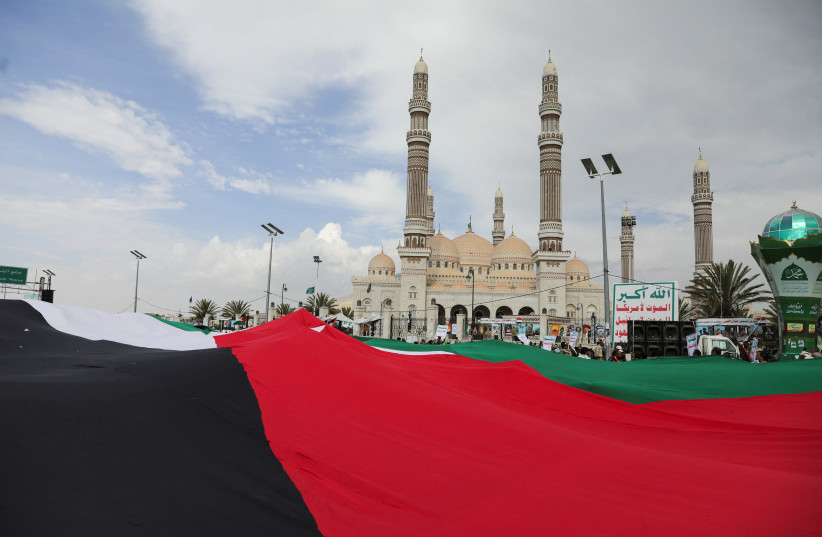The Houthis, who have been targeting ships off the coast of Yemen, issued a statement bragging about their extensive military capabilities. The statement was meant to commemorate what they call the anniversary of the “Saudi-Emirati aggression.”
This is the anniversary of Saudi Arabia intervening in Yemen to prevent the Iranian-backed Houthis from taking Aden.
The Houthis have adopted a new narrative in which they now interpret their war in Yemen as part of a regional struggle for the Palestinians. The Houthis have always had an anti-Israel and anti-American, as well as anti-Jewish worldview, but they have become more interested in working with Palestinian terrorist groups in recent years.
This is part of their graduation to a new rung on the Iranian proxy ladder, essentially making the Houthis an important property for Iran in the region, similar to Hezbollah.
The Houthi statement on March 26 says the Saudi intervention in Yemen in 2015 “came within the framework of a comprehensive plan in the region to rearrange it under the leadership of the Israeli enemy and liquidate the Palestinian issue, adding that one of the goals of the aggression against Yemen was to enable the Israeli enemy to lead the region, and to arrange its situation, as appeared in the normalization program, or Deal of the Century.”

Houthis claim to have shot down 165 aircraft, probably an exaggeration
The Houthis, therefore, link their war in Yemen, which reached a peak in 2014 and 2015, as being linked to the Abraham Accords, which happened in 2020. They are reversing history to suit their narrative.
As part of the commemoration by the Houthis of their “successes,” they also issued a long list of things they claim the Saudis, the UAE, and others targeted in Yemen. The Houthis also claim numerous “successes,” such as destroying 18,397 vehicles and “machines” of the “enemy.” They also claim that they shot down 165 warplanes and other aircraft.
There is no way to confirm this, and it appears to be a major exaggeration. The Houthis have downed some large drones over the years, though. They also claim they carried out 38 “naval operations.” The Houthis also targeted ships. This doesn’t include the recent campaign of targeting ships in the Red Sea.
The Houthis also claim to have launched 1,828 missiles, apparently a reference to missile attacks on Saudi Arabia. They also bragged about 589 “operations outside the borders.”
It’s not clear what this refers to, but the Houthis have attacked Saudi Arabia and the UAE and threatened other countries.
In addition, the Houthis say their drones, many of them modeled on Iranian technology, have been involved in 12,009 missions, of which 997 were “outside” the borders of Yemen.
The Houthis are backed by Iran, and they now develop their own missiles and drones, sometimes by combining them with smuggled parts from Iran. The statement claimed that the Houthis’ “path in manufacturing weapons from missiles and various other military capabilities started from scratch.”
The report does not have many details about the advanced capabilities the Houthis now claim to possess. Nevertheless, the statement is important because it illustrates how they now see the region.
They used to be focused primarily on Yemen during the civil war a decade ago. Now, they are more interested in attacking Israel and threatening the region.
The Houthis have adopted the Iranian views about the “new world order,” and they want to help push the region into this new order.
